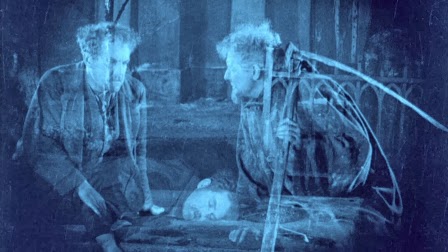From the module Film Theory I
Coeur Fidele (Jean Epstein, 1923) and Smiling Madame Beudet (Germaine Dulac, 1923)
What I liked about those films is their relationship to the Impressionist film theory and movement, I'm becoming more and more fascinated with these early scholarly writings because they make us understand how much we now take for granted in the cinema experience. Germaine Dulac and Jean Epstein were exploring the possibility cinema has of exploring the flux of the human consciousness. If you are interested in the topic these films together with the two authors/directors' main writings are key starting points. You will realize how important a close-up (so common and natural nowadays) was to express that possibility, and the status of cinema as the new art.
From the module French New Wave
The 400 Blows (Francois Truffaut, 1959)
Where shall I start? This film, together with Citizen Kane and Casablanca was one of my first and most beloved approaches to the magic of cinema. Truffaut's autobiographical film is not as much an open eye on his life, but the story of a universal situation regarding growing up and being a teenager in a family and society who are not able to understand you. But this is not everything the film is, this film has not influenced the world for its narrative only. Truffaut was able to find his voice in a new poetic of visual, which, more than anything else, hommages the love for cinema as the medium able to, why not, bring out an individual's hidden self, the medium able to speak directly to the soul. Truffaut's career and life will unfortunately conclude in 1984 after one last film: Confidentially Yours (Vivement Dimanche), the ending sequence of this film is a beautiful conclusion to what he started in 1959, watch it to see what I mean, I'll just tell you that the cinema is the game the children live and play with, the cinema is life.
From the module Topics in World Cinema
The Hour of the Furnaces (Octavio Getino and Fernando Solanas, 1968)
We watched the first part of this political manifesto film divided into three parts and coming out at a very particular moment in history: a moment in which all over the world filmmakers and intellectuals were starting to subvert the system at the service of the people. In this context Solanas and Getino wrote the Manifesto Towards a Third Cinema which is still one of the most important writing about cinema. Influenced by Marxist dialectic and based on class struggle the film has a very complex structures. Each part is subdivided into different sections each cross-cutting between intertitles used to deliver the political message, and the most disparate images: newsreels, advertisements, still images about consumerism, white society critique concerning the Unites States especially. The very disturbing slaughter's scene aims to show the unpleasant work behind the making of products and serves as an allegory for the selling of a nation, Argentina in this case. The iconic final shot shows a still of dead Che Guevara's close-up, a scene lasting 2 mins and 40 secs, through its dialectical film form the film requires the people to complete the last stage of class struggle and reach a new synthesis. A must-see for film lovers who appreciate the political engagement cinema offers.
From the module Cinema and Spectatorship
Among this list this is probably the most difficult film to find, but if we do, please watch it. It was a different and puzzling experience. The film is set in the black ghetto in LA in the 70s when the white police was violently attacking the black community. This story is not a common story, though we see characters, but we hardly recognize the characters and identify with them, because they embody the story of a social condition more than that of a single person. The recognizable protagonist is Dorothy, a woman and single mother struggling with alcoholism, parenting, marginalization, and the institutions. A touching text which does not leave a lot of space for melodramatic situations, only for the harshness of the truth.




























